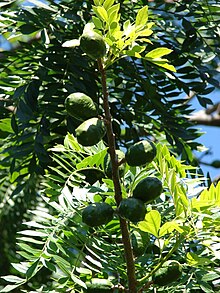| Spondias | |
|---|---|

| |
| Fruiting Spondias mombin | |
| Scientific classification | |
| Kingdom: | Plantae |
| Clade: | Tracheophytes |
| Clade: | Angiosperms |
| Clade: | Eudicots |
| Clade: | Rosids |
| Order: | Sapindales |
| Family: | Anacardiaceae |
| Subfamily: | Spondiadoideae |
| Genus: | Spondias L. |
| Type species | |
| Spondias mombin L. (1753)
| |
| Species | |
|
See Selected species | |
| Synonyms[1] | |
| |
Spondias is a genus of flowering plants in the cashew family, Anacardiaceae. The genus consists of 17 described species, 7 of which are native to the Neotropics and about 10 are native to tropical Asia. They are commonly named hog plums, Spanish plums, Ciruelas in Cuba, libas in Bikol and in some cases golden apples for their brightly colored fruit which resemble an apple or small plum at a casual glance. They are only distantly related to apple and plum trees, however. A more unequivocal common name is mombins.

A theory regarding the name of the city of Bangkok, Thailand is that the name is derived from Thai: -มะกอกน้ำ; RTGS: makok nam 'water olive', the Thai name for the fruit of Spondias dulcis.[2] In Cambodia, Spondias pinnata is called /pɷːn siː pʰlaɛ/ (ពោនស៊ីផ្លែ) or /məkaʔ prẹj/ (ម្កាក់ព្រៃ),[3] and Spondias dulcis simply /məkaʔ/ (ម្កាក់). Spondias pinnata is called Pulicha kaai in the Tamil language, which means "sour fruit." It is also called "Amate Kaai" in the Kannada language, Ambade in Tulu and Konkani. In Sri Lanka it is called Amberella. In Bangladesh it is known as Aamra (আমড়া) and when served with seasonings it is a very popular street food.
- ^ Spondias L. Plants of the World Online, Kew Science, retrieved 1 January 2024
- ^ "ชั้นและตำบลที่ตั้งวัด" Archived 2011-06-23 at the Wayback Machine, watarun.org, accessed March 29, 2011.
- ^ LETI, Mathieu, HUL Sovanmoly, Jean-Gabriel FOUCHÉ, CHENG Sun Kaing, Bruno DAVID, Flore photographique du Cambodge, Paris: Privat, 2013, p. 63.